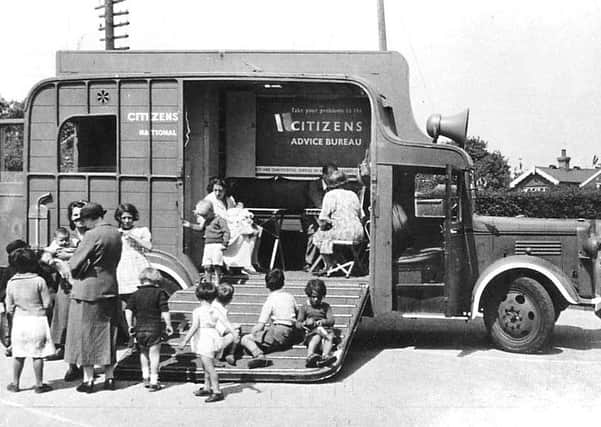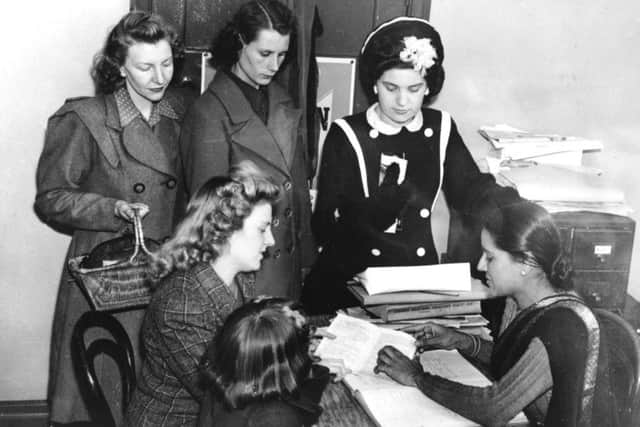80 years of Citizens Advice tells a story of modern Britain – Derek Mitchell


The day after Britain and France declared war on Germany in 1939, more than 200 Citizens Advice Bureaux were established across the UK. The first CABs in Scotland were in Glasgow, Aberdeen, Stirling and Dundee.
The advice dispensed in those early years was tied to how the war had affected families across the UK. As the blitz wreaked havoc on the civilian population, the first CABs were busy tracing missing people, arranging evacuations and helping with war damage claims.
Advertisement
Hide AdAdvertisement
Hide AdRationing also generated thousands of enquiries and CABs were instrumental in persuading the Government to grant extra clothes coupons to pregnant women, perhaps the first example of the type of advocacy we deliver every day.


The end of the Second World War saw the emergence of the Welfare State and actually increased demand for the service. Housing problems, for example, grew, and changes to family life increased as society began to change. The advent of legal aid and the NHS led to a surge in demand as people needed help accessing these new welfare services.
In 1975, the regional office for Scotland, the Scottish Association of Citizens Advice Bureaux, became an autonomous umbrella organisation, and then an independent charity in 1980. Each CAB in our network is its own independent charity, evolving to face the challenges of their local community.
By the 1980s, the advent of Thatcherism brought with it increased demands for help around employment and social security. The growth of consumerism saw debt, stemming from ‘easy credit’, become the biggest issue for our network in the late 1980s and it remains one of the biggest issues we see today. The CAB network is the largest provider of free debt advice in Scotland.
Unacceptable in 21st century Britain
Since the turn of the millennium, we have seen people increasingly struggle with the cost of living. This has been driven by the global financial crisis of 2008, the period of austerity that followed, the growth of consumer debt, the surge in precarious work, the implementation of Universal Credit, and the ongoing uncertainty around Brexit. Far too many people make choices daily about whether to heat their homes or feed their children. In 21st century Britain, this is unacceptable.
Today, our network helps hundreds of thousands of people every year, on more than 750,000 issues. When people seek our help it’s never “just one thing”. Life isn’t that simple.
Someone can walk through the door of a CAB with a phone bill that seems too high and one they can’t afford. When they sit down with one of our advisers that phone bill proves to be the tip of the iceberg. This person is struggling with their energy bills too and the council is chasing them for unpaid council tax.
The washing machine has broken down, they can’t afford to get it fixed or to get a new one so are contemplating an expensive rent-to-own scheme that will just see them paying more in the long run.
Advertisement
Hide AdAdvertisement
Hide AdThey aren’t claiming the benefits they are entitled to. They don’t think they could or should because they are working. But their boss is paying them a wage that is actually under the national minimum wage, and their hours change week to week. They aren’t getting sick pay or holiday pay and don’t know if they have a right to it.
That can all start with a phone bill.
Changing the system
Our network has two aims: advice and advocacy. It’s our duty to look at the issues coming through our doors and take them to the floor of parliaments and the headquarters of industry to deliver positive change for people.
In the post-devolution era, we shaped legislation around issues such as social security, debt and transport. For example, the recently announced funeral support payment from the Scottish Government will be uprated with inflation, thanks to our campaigning. Further to this, the Treasury is currently consulting on recommendations we made for prepaid funeral plans to be regulated by the Financial Conduct Authority. The Competition and Markets Authority is carrying out a market investigation review, which we supported and which our research contributed to.
These are issues that came through the doors of our CABs; we not only helped those individual cases, but are working to change the system so it benefits everyone.
We can do things like this because as an organisation we have a unique view of the economy, through the lived experience of people across the whole of Scotland. We can see where the problems are stacking up. That’s why we were one of the first organisations to call for the roll out of Universal Credit to be halted and the problems fixed.
It’s why now, as Government and big business brandish their green credentials, that we are demanding honesty for consumers about what the impact of fast reductions in emissions will mean for infrastructure, energy bills and our way of life. We support bold targets on emissions, but we will continue to press government and industry to make sure they manage that transition in a way that protects people.
This extraordinary service, seeking to help people locally and deliver change nationally, is powered by volunteers. We have over 2,000 volunteers working in our CAB network, and their hard work is worth so much to us and the people they help.
At a time of political and economic uncertainty, people should know that the Citizens Advice service is here to help. We have been for 80 years, and we will continue to be. It’s what we do.
Derek Mitchell is chief executive of Citizens Advice Scotland
